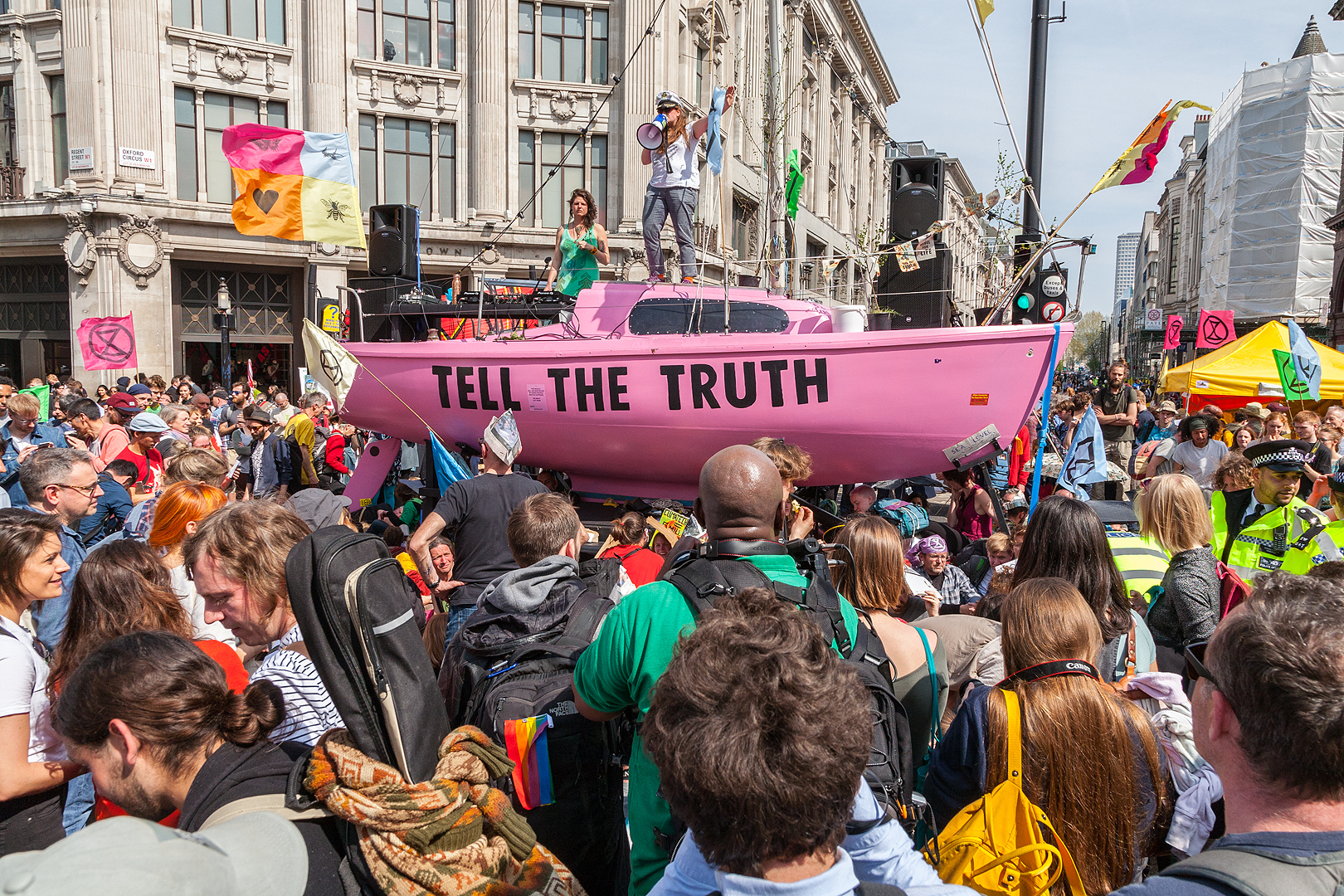‘Incredibly vague’ wording of a parliamentary bill would ‘effectively put the U.K. on par with some of the more repressive countries in the world.’
In April 2019, activists chained themselves to a pink boat in the middle of Oxford Circus, one of London’s most famous intersections. A lime green Extinction Rebellion flag flew from the top of the boat, and on one side was the slogan “Tell the truth.” Traffic at one of the city’s busiest intersections came to a grinding halt, as protesters occupied the road.
All across the city, Extinction Rebellion caused disruption. They occupied Waterloo Bridge, obstructed trains, and glued themselves across the entrance of the London Stock Exchange. More actions followed throughout the year. The purpose was to push the government into taking serious action on the climate crisis. Approve of their methods or not, these bold actions forced the world to pay attention.
Now, the U.K. government is debating a new bill that would give police more powers at protests in England and Wales. In the Police, Crime, Sentencing and Courts Bill, people breaching police rules at demonstrations will face increased penalties, and the police would have new powers to control static and single person protests. They could impose start and finish times, and enforce maximum noise levels if a protest could cause “significant impact” for people nearby or “serious disruption” to a business.
The bill stipulates that the rules would also apply to a protest of just one person. Theoretically, someone standing with a sign and being disruptive could be fined up to £2,500. The bill would also stop vehicular access to Parliament being blocked by demonstrations, and anyone refusing to move when asked by the police would be causing an offence.
In summer 2020, London came to a standstill for another reason. Following the police killing of George Floyd in Minneapolis, the Black Lives Matter movement marched through the city, forcing the country to pay attention to racial injustice.
The Home Office fact sheet refers to the Extinction Rebellion protests before outlining any measures. Following their actions, Home Secretary Priti Patel said that Extinction Rebellion was an emerging threat, and called the Black Lives Matter protests “dreadful”.
The bill, which covers a whole range of issues beyond just protests, passed its second reading in the House of Commons on March 15, just two days after police were criticized for their handling of the peaceful vigil for Sarah Everard, the 33 year-old London woman who was murdered while walking home through a park on the evening of March 3. Police used physical force to break up the Clapham Common vigil, which became a call for changes that would keep women safer (a later report stated that the police “acted appropriately”, but the report has also been criticized). Since then, ‘Kill the Bill’ protests have erupted across the country. The date for the next step, committee stage, is yet to be announced.
The right to cause disruption
Organizations and prominent individuals from across England and Wales have signed a letter to the Home Secretary and Secretary of State for Justice, sharing their concerns.
One of those organizations is Netpol, the Network for Police Monitoring. In a phone interview, Netpol’s Campaigns Coordinator Kevin Blowe told The Conversationalist that the bill cracks down on protests which are non-violent, but disruptive.
“What we’ve always said is that all protests are disruptive to some degree. If that wasn’t the case, it wouldn’t be a protest,” he said.
The sections of the bill aimed at stopping people causing serious disruption would place “subjective, wholly disproportionate power in the hands of the police,” he said.
Beyond this, Home Secretary Priti Patel would have the power to define what exactly constitutes serious disruption. There would be no parliamentary debate.
“The police already have extensive powers. The idea that somehow things are swung too far in favour of the protesters is simply not true,” Blowe said.
With a strong Conservative majority, he believes this bill is likely to pass a parliamentary vote in some form.
The U.K., like many other countries, has a history of change-making through disruptive protest. In the early 1900s, when peaceful protest had done nothing to gain women the right to vote, Emmeline Pankhurst led the Suffragettes in a campaign of civil disobedience. They smashed windows, started riots, and snuck into parliament. Perhaps most famously, Emily Davison threw herself under the King’s horse. The campaign led to a parliamentary commission to study the issue of women’s suffrage; and in 1918, British women finally won the right to vote.
With such a strong history of protest, will this bill, if it becomes law, stop people from being disruptive?
“It’s not going to stop people from going out in the streets and campaigning around climate change. It’s not going to stop people coming out, because they’re outraged about racial injustice, or indeed protesting around the expansion of police powers,” Blowe said. Protest, he added, “is the only way that people see as having any chance of getting the Government to listen.”
More likely, said Blowe, more people will end up being arrested, while certain social and political movements will be criminalized.
In an email statement, a Home Office spokesperson said: “It is wrong to claim these measures will stop people from carrying out their civic right to protest. People will still be able to protest, but they cannot be permitted to trample on the rights of local businesses and communities.”
Members of Parliament who represent other parties have been vocal about the damage the bill could do.
The Liberal Democrat Spokesperson for Home Affairs, MP Alistair Carmichael tweeted: “This crackdown on protests is dangerous and draconian and must be opposed.”
Meanwhile Labour MP Zarah Sultana called the bill a “recipe for repression” on Twitter, and Jenny Jones, Green Party member of the House of Lords (who’s also an activist) tweeted: “We need to understand that our rights and freedoms are under threat from our Govt.”
Netpol, along with other organizations, said that the whole 307 page bill needs to be opposed. In fact, ahead of this bill, Netpol put forward their own Charter for Freedom of Assembly Rights, asking for transparency of policing at protests.
A global issue
Article 19, an organization defending freedom of expression and information, also signed the joint letter speaking out against the bill.
“The incredibly vague and broad language that’s in the U.K. policing bill will effectively put the United Kingdom on par with some of the more repressive countries in the world,” says Executive Director Quinn McCew in a Zoom interview.
She said that what’s happening in the U.K. is part of a broader global issue, with governments trying to control civil society and people’s ability to hold them to account. She pointed at Hong Kong, which saw sustained street demonstrations to protest the Chinese government’s repressive restrictions on freedom of expression, as one of the worst examples of government suppression: “Incredibly draconian laws put in place there have effectively cut off the legs of the protest movement.”
She also speaks about Kenya, where Covid-19 emergency powers have been used to silence protests against police brutality.
“The justification for clamping down on and using violence against those protesters was exactly the same as the justification that the U.K. Government and the police ultimately gave for the violence they used against the protesters at the vigil in Clapham Common,” McCew said.
Aside from the impact on freedom to protest in England and Wales, she believes the bill could send ripples around the world, with other nations following the U.K.’s lead.
The right to freedom of peaceful assembly, or the right to protest, is enshrined in laws across the world. It’s included in the Universal Declaration of Human Rights. And it’s not just the U.K. battling with new protest laws.
In November 2020, the French government put forward a law that would criminalize the act of sharing images or videos of police. This ban on filming police, activists warn, could allow police brutality to go unchecked. The tragic final moments of George Floyd’s life were caught on camera and have provided vital evidence in the ongoing trial of Derek Chauvin, the police officer who has been charged with his murder, but this is not true for other police killings—like that of Adama Traoré, who died in the custody of French police in 2016.
While the law goes through various stages and rewrites, protesters are opposing it across the country.
Even without this new law, demonstrators face rubber bullets, tear gas, and weapons used by police. There’s not just a risk of criminalization and fines, but of serious injury.
Defending protest with protest
In June 2020, Black Lives Matter demonstrators pulled down a statue of 17th century slave trader Edward Colston from its plinth in Bristol, as crowds cheered. Its next destination—Bristol Harbour. If the new bill goes through, anyone defacing a monument could face a 10 year prison sentence, and the events of summer 2020 are cited in the bill’s explanatory notes as the reason for this change in law.
Following the Clapham Common vigil and the bill’s second reading, protests continue across the country, with the issue of women’s safety high on the agenda. Both protesters and MPs have drawn comparisons between the protections proposed for monuments and statues, and the protections that women are so desperately demanding.
Interviewed by Sky News, Labour MP David Lammy said: “It is the case here in the U.K., that the starting tariff in prison is five years for rape […] Why are we saying that pulling down a statue is more important than a woman’s body?”
It’s a point that McCew has made, too.
“Looking at what happened during the policing of the vigil for Sarah Everard, and looking at the language that’s in the policing bill, it’s quite clear that there’s a higher level of support for protecting a slaveholding monument than there is for women’s rights and women’s ability to speak,” she said.
If this bill goes through, McCew says the bill could lead to even greater civil unrest. The two biggest global issues—the climate crisis and the call for racial justice—are the very two issues that the police and government are trying to restrict. Rather than fewer disruptive protests, there could be more.



